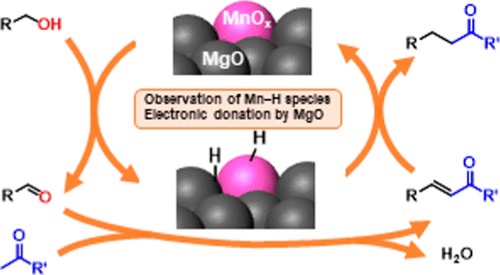

醫藥和農用化學品的原料:從酒精中合成酮!
ー 東京工業大學開發的錳催化劑 ー
東京工業大學
創新研究院
前沿材料實驗室
原教授
10月7日,
我們從酒精中合成了酮,它們是醫藥和農用化學品的原料。
成功開發錳催化劑。
發表在美國化學學會出版的催化學術期刊ACS Catalysis上。
醫藥、農藥原料:
吡咯和喹啉是藥物、農藥和補充劑的原料。
它是使用“鈀和釕等貴金屬”作為催化劑製造的。
因此,製造成本很高。
鈀和釕:
鈀和釕等貴金屬儲量稀少。
而且,由於催化劑結構的複雜性,催化劑材料的回收利用並不容易。
替代催化劑材料的開發:
“錳和鐵等無處不在的廉價金屬”作為貴金屬替代品備受關注。
原教授和他的研究團隊:
在“生物質中所含酒精的轉化反應”中,
據報導,“MgO顯示出顯著的促進作用”。
這次,
通過將 MgO 的這種促進作用應用於錳催化劑,
我們證實了“醇的碳-氧鍵”可以“轉化為碳-碳鍵”。
結果,我們澄清了轉換實際上是可能的。
成功合成吡咯和喹啉,是醫藥和合成中間體。
本期成績:
研究團隊
錳,
鎂,
通過使用鋁作為催化劑,
可以通過少量步驟和低成本合成“有機化合物中的有用有機化合物”。
技術+
https://news.mynavi.jp/techplus/article/20221011-2478325/
Matières premières pour la pharmacie et l’agrochimie : synthèse de cétones à partir d’alcool !
ー Catalyseur au manganèse développé par Tokyo Tech ー
Institut de technologie de Tokyo
Institut de recherche innovante
Laboratoire des matériaux frontières
Professeur Hara
7 octobre,
A partir d’alcool, nous avons synthétisé des cétones, qui sont des matières premières pour la pharmacie et l’agrochimie.
A réussi à développer un catalyseur au manganèse.
Il a été publié dans ACS Catalysis, une revue académique sur la catalyse publiée par l’American Chemical Society.
Matières premières pour la pharmacie et l’agrochimie :
Le pyrrole et la quinoléine sont des matières premières pour les produits pharmaceutiques, les produits chimiques agricoles et les suppléments.
Il est fabriqué en utilisant des “métaux précieux tels que le palladium et le ruthénium” comme catalyseurs.
Les coûts de fabrication sont donc élevés.
Palladium et Ruthénium :
Les réserves de métaux précieux tels que le palladium et le ruthénium sont rares.
De plus, du fait de la complexité de la structure du catalyseur, il n’est pas aisé de recycler le matériau catalyseur.
Développement de matériaux catalyseurs alternatifs :
Les « métaux omniprésents et peu coûteux tels que le manganèse et le fer » attirent l’attention en tant que substituts de métaux précieux.
Professeur Hara et son équipe de recherche :
Dans “Réaction de conversion de l’alcool contenu dans la biomasse”,
Il a été rapporté que “MgO montre un effet promoteur remarquable”.
cette fois,
En appliquant cet effet promoteur du MgO aux catalyseurs au manganèse,
Nous avons confirmé que “la liaison carbone-oxygène de l’alcool” peut être “convertie en une liaison carbone-carbone”.
En conséquence, nous avons précisé que la conversion est effectivement possible.
A réussi la synthèse des pyrroles et des quinoléines, qui sont des produits pharmaceutiques et des intermédiaires de synthèse.
Réalisations cette fois :
L’équipe de recherche
manganèse,
magnésium,
En utilisant l’aluminium comme catalyseur,
Il est possible de synthétiser des “composés organiques utiles à partir de composés organiques” avec un petit nombre d’étapes et à faible coût.
TECH+
Rohstoffe für Pharmazeutika und Agrochemikalien: Synthese von Ketonen aus Alkohol!
ー Mangan-Katalysator Entwickelt von Tokyo Tech ー
Technisches Institut Tokio
Institut für innovative Forschung
Labor für Grenzmaterialien
Professor Hara
7. Oktober,
Aus Alkohol haben wir Ketone synthetisiert, die Rohstoffe für Pharmazeutika und Agrochemikalien sind.
Es gelang ihm, einen Mangankatalysator zu entwickeln.
Es wurde in ACS Catalysis veröffentlicht, einer wissenschaftlichen Zeitschrift zur Katalyse, die von der American Chemical Society herausgegeben wird.
Rohstoffe für Pharmazeutika und Agrochemikalien:
Pyrrol und Chinolin sind Rohstoffe für Arzneimittel, Agrochemikalien und Nahrungsergänzungsmittel.
Es wird unter Verwendung von “Edelmetallen wie Palladium und Ruthenium” als Katalysatoren hergestellt.
Daher sind die Herstellungskosten hoch.
Palladium und Ruthenium:
Vorräte an Edelmetallen wie Palladium und Ruthenium sind knapp.
Darüber hinaus ist es aufgrund der Komplexität der Katalysatorstruktur nicht einfach, das Katalysatormaterial zu recyceln.
Entwicklung alternativer Katalysatormaterialien:
„Allgegenwärtige und preiswerte Metalle wie Mangan und Eisen“ ziehen als Edelmetallersatz die Aufmerksamkeit auf sich.
Professor Hara und sein Forschungsteam:
In “Umwandlungsreaktion von in Biomasse enthaltenem Alkohol”,
Es wurde berichtet, dass “MgO eine bemerkenswerte fördernde Wirkung zeigt”.
diesmal,
Indem man diese fördernde Wirkung von MgO auf Mangankatalysatoren anwendet,
Wir haben bestätigt, dass „die Kohlenstoff-Sauerstoff-Bindung von Alkohol“ „in eine Kohlenstoff-Kohlenstoff-Bindung umgewandelt werden kann“.
Als Ergebnis haben wir klargestellt, dass eine Konvertierung tatsächlich möglich ist.
Erfolgreich bei der Synthese von Pyrrolen und Chinolinen, die Pharmazeutika und synthetische Zwischenprodukte sind.
Erfolge diesmal:
Das Forschungsteam
Mangan,
Magnesium,
Durch die Verwendung von Aluminium als Katalysator
„Nützliche organische Verbindungen aus organischen Verbindungen“ lassen sich mit wenigen Schritten und kostengünstig synthetisieren.
TECH+
Inexpensive, Reusable Mn Catalysts Make for Efficient Alkylation of Ketones With Alcohols
Tokyo Institute of Technology
A newly developed manganese (Mn) catalyst facilitates efficient conversion of alcohols into diverse organic compounds without requiring the addition of a base and producing water as the only byproduct,
Tokyo Tech researchers
find in a new study.
The Mn catalysts are inexpensive, reusable,
do not require large energy for waste treatment, and demonstrate product yields as high as 92%.
Tokyo Tech News
https://www.titech.ac.jp/english/news/2022/065051
Heterogeneous Low-Valent Mn Catalysts for α-Alkylation of Ketones with Alcohols through Borrowing Hydrogen Methodology
ACS Catalysis
Abstract
Alcohol transformations through the borrowing hydrogen (BH) methodology
have attracted attention due to its high atom economy and substrate availability.
Nonprecious metal heterogeneous catalysts have recently been extensively explored;
however,
the difficulty in the observation of the active metal species has prevented mechanistic studies.
Here,
we report on supported Mn catalysts that act as reusable heterogeneous catalysts
for the construction of C–C bonds by the α-alkylation of ketones with alcohols through the BH methodology.
The catalyst,
a Mn2+ species-MgO mixture-deposited Al2O3 support (Mn-MgO/Al2O3),
exhibits catalytic performance for the reactions to give the corresponding products in 50–92% yield.
The present catalyst did not require the addition of homogeneous strong bases
that are typically indispensable for these reactions using the reported Mn-based heterogeneous catalysts
and that require large energy consumption for separation, recycling, and waste treatment.
While the addition of bases to such reaction systems has been considered to accelerate the dehydrogenation of alcohols and/or aldol condensation,
MgO in Mn-MgO/Al2O3, a heterogeneous base,
does not contribute to these steps.
Fourier transform infrared spectroscopy (FT-IR) measurements indicated not only the incorporation of Mn hydride species,
which has never been observed on heterogeneous Mn-based catalysts by the dehydrogenation of alcohols,
but also enhancement of the hydrogenating capability of the Mn hydride species by co-deposited MgO on Al2O3.
While such hydride species had been found to accelerate direct amination of alcohols over a metallic Ru nano particles-MgO mixture,
the present study reveals that the reaction mechanism is extended to α-alkylation of ketones with alcohols over oxidized Mn, a base metal, in contact with MgO.